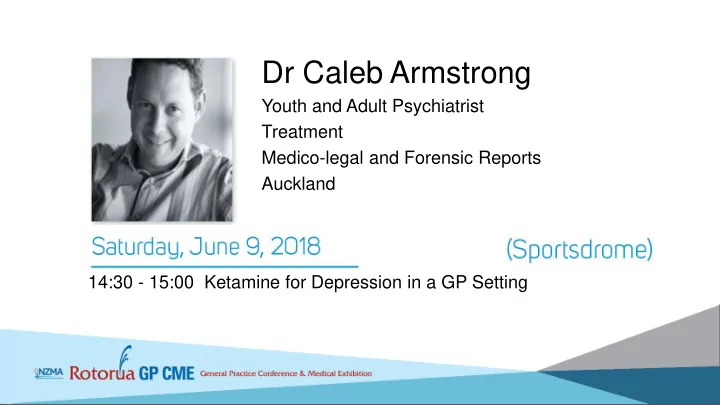

Dr Caleb Armstrong Youth and Adult Psychiatrist Treatment Medico-legal and Forensic Reports Auckland 14:30 - 15:00 Ketamine for Depression in a GP Setting
Ketamine for Treatment Resistant Depression: a GP model of care? GPCME 2018
Ketamine: History • Ketamine is a dissociative anaesthetic on the WHO list of essential drugs due to its usefulness in producing anaethesia without respiratory or cardiac depression • Ketamine is a glutamate antagonist at NMDA receptors • By the mid 1990s there was an emerging literature to support the use of Ketamine as an antidepressant but little follow up till the mid 2000s • Despite its superior safety profile and effectiveness, Ketamine is not widely available for use even in cases where it might be indicated
Ketamine in New Zealand and Australia • There is a Ketamine clinic in Dunedin, run by Professor Paul Glue. • Dr Angelo De Gioannis runs a Clinic in Brisbane specializing in the use of oral Ketamine and has published research on the use of oral ketamine for treatment resistant depression • There is a ketamine clinic in Tasmania. • Colleen Loo at the Black Dog Institute in New South Wales has published many studies regarding the clinical use of Ketamine
Ketamine – for which patients? • Research on Ketamine focusses on treatment-resistant states of anxiety and depression and PTSD, with a further focus on severe cases • Treatment-resistant depression is defined as depression which does not respond to two adequate trials of an antidepressant medication • It is perhaps surprising that even in this very difficult-to-treat group, response rates to ketamine are very high • One of the target symptoms is suicidal thinking, with studies showing that this symptom may be rapidly relieved by ketamine
Current State of Ketamine Treatment Globally • There is extensive research about the use of ketamine • It is probably most commonly used in the US – commonly via IV infusions • Other clinics provide Ketamine via the subcutaneous route • Most providers have to have patients come in to their premises for each treatment • Repeated doses produce better results and are feasible in terms of side effects
Why IV/SC dosing? • Proven effectiveness • Patients not going home with ketamine in any form – no diversion • For some providers – financial incentive to have patients come back repeatedly? • Frequent review • Previously – lack of research into effectiveness of oral ketamine
Ketamine – particular points • Ketamine may produce rapid resolution of symptoms • Ketamine appears to have a specific anti-suicide effect • Ketamine appears to work in a hard-to-treat patient population • How long do we treat for? Ketamine provides answers but raises questions. Discussion with providers of ketamine shows that many patients maintain wellness post-treatment and some require ongoing dosing.
Oral Ketamine – A model • Ketamine has known side effects, usually mild, but sometimes distressing – they include dissociation and rarely hallucinations. Doses range from 50mg to 600mg per day • Therefore I do not believe that it will ever be appropriate to give people their first dose of oral ketamine outside a health care facility • However, dosing at home may be suitable for some patients who do not have these side effects • Specialist clinics can fine-tune dosages and ideally provide psychotherapy to patients – for best results – and the involvement of a psychiatrist is needed
Oral Ketamine – a proposed model • Some patients will both respond to Ketamine and have side effects. For a given patient, they may never be able to have doses at home. If no one can offer a safe environment, they may never be able to have ketamine • The titration of Ketamine is simple – • 1. Consent is obtained (of course following psychiatric assessment) and baseline depression scores (using MADRS) obtained • 2. The patient is given a dose of ketamine approximately 0.5mg/kg orally and blood pressure is taken. Transient increases in blood pressure may occur, and decreases in blood pressure may indicate response. • 3. The patient may experience side effects for 45-120 mins and should not drive afterwards • 4. Post-treatment MADRS administered for response
Titration Continued • Because doses are variable, several sessions may be required to titrate some clients • Titration could occur in a GP setting with enough discussion with a psychiatrist and preferably the presence of that psychiatrist to train practice nurses in the administration of this • The role of GPs could be to prescribe and administer ketamine to stable patients, to provide treatment to those with distressing side effects (oral lorazepam for instance), to be involved in decision making regarding home dosing and spacing out doses/stopping ketamine
Not my idea…. • This idea actually came from a nurse in the Ketamine clinic in Dunedin – she felt it should be “totally normalized” and the administration of ketamine shouldn’t require a specialist setting • I was initially hesitant to accept this but after some more experience I agree • GP setting would allow SC administration as well, where this seems indicated
Great idea, but…. • I have not yet worked out costing of this • There are a limited number of psychiatrists with any experience at all of using ketamine • Diversion of ketamine is a possibility where people are sent home with it (probably needs weekly dispensing and close control) even though doses required are much less than those typically abused • Psychiatric input is a must – this is a difficult to treat patient group • This model doesn’t cover the provision of psychotherapy to this group
Expressions of interest? • If you view your clinic as a potential partner in this venture please express your interest to me if you see me around or email: • Privatepsychiatrist1@gmail.com • Many thanks
Recommend
More recommend